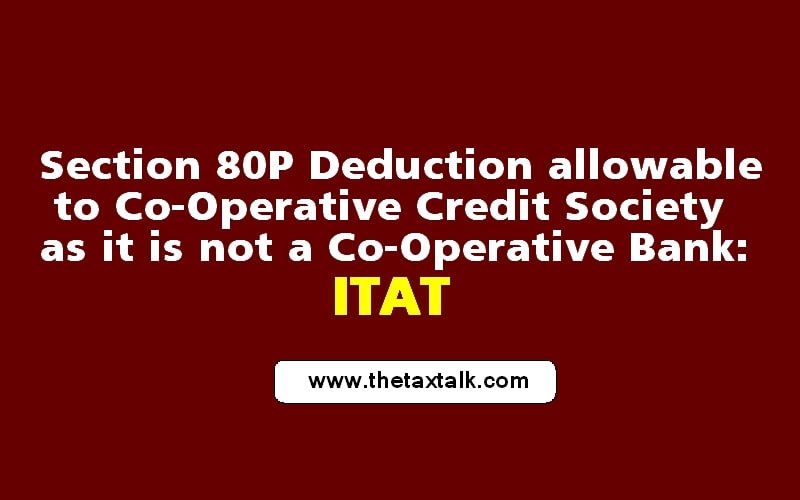![]()
Section 80P Deduction allowable to Co-Operative Credit Society as it is not a Co-Operative Bank: ITAT
The Kem Hospital And Seth G. S. Medical College Employees Co-Operative Credit Society Ltd vs Union Of India
WP/766/2020
Short Deduction of the case:
The Income Tax Appellate Tribunal (ITAT), Mumbai Bench ruled that the deduction under Section 80P of the Income Tax Act, 1961 is allowable to co-operative credit societies as it is not a co-operative bank. The assessee, The KEM Hospital & Sheth GSM College Employees Co-operative Credit Society Limited is a co-operative credit society carrying on finance/banking business i.e. financing their members and collecting deposits from them by way of FDs etc. had filed its return of income for AY 2015-16 on 30.09.2015, declaring a total income of Rs. Nil i.e after claiming deduction of Rs. 1,64,84,079/- under Section 80P(2) of the Act. The return of income filed by the assessee was initially processed as such under Section 143(1) of the Act. Subsequently, the case of the assessee was taken up for scrutiny assessment under Section 143(2) of the Act. During the course of the assessment proceedings, it was submitted by the assessee that it was a co-operative credit society and its only business was to grant medium term, short term and long term loans to its members. It was observed by the A.O that the assessee had claimed deduction under Sec. 80P(2) of Rs. 1,64,84,079/-. However, the A.O was not persuaded to subscribe to the aforesaid claim of deduction raised by the assessee under Sec.80P of the Act. The A.O held a conviction that the assessee being a primary co-operative bank was hit by the provisions of Sec. 80P(4), and thus, was not eligible for claim of deduction under Sec. 80P(2)(a)(i). The contention of the assessee that it was a co-operative credit society providing banking/credit facilities only to its members and was not a co-operative bank providing banking/credit facility to the public at large did not find favour with the AO. It was observed by the A.O that deduction allowable under Section 80P(2)(a)(i) in the case of co-operative credit society engaged in carrying on the business of banking (co-operative banks) was withdrawn by the legislature in all its wisdom from the assessment year 2007-08, except in the case of a “primary agricultural credit society” or “a primary co-operative agricultural and rural development bank”. The AO observed that as the assessee fulfilled all the three conditions laid down under Section 56(c)(ccv) of Part V of the Banking Regulation Act, 1949. Firstly, the primary object of the principal business of the co-operative society is the transaction of banking business. Secondly the paid-up share capital and reserves of the co- operative society are not less than one lac of rupees; and thirdly, the bye laws of the co-operative society did not permitted admission of any other co-operative society as a member, therefore, it clearly fell within the category of a primary co-operative bank. The CIT(A) held a conviction that as in the case of assessee co-operative society the acceptance and lending of money was only from the members and not from the public thus, it could safely be concluded that the principal business or primary objective of the assessee co-operative credit society was not the business of banking. The urged that the CIT(A) has erred in not considering the fact that the Hon’ble Supreme Court has granted leave against High Court’s order where it has been held that assessee co-operative society could not be regarded as Co-operative Bank on mere fact that an insignificant proportion of revenue was coming from non- members, and thus, was entitled for deduction under section 80P(2)(a)(i). The coram of a Judicial Member, Ravish Sood and Accountant Member, Manoj Kumar Aggarwal noted that noted that the assessee being a co-operative credit society is neither authorized nor had undertaken any of the banking business activities as are carried out by a primary co-operative bank, but had only provided financial assistance/credit to its members, therefore, it can safely be concluded that it cannot be held to be a co-operative bank. Therefore, the ITAT ruled that the assessee would not be hit by the provisions of Section 80P(4) of the Act.


